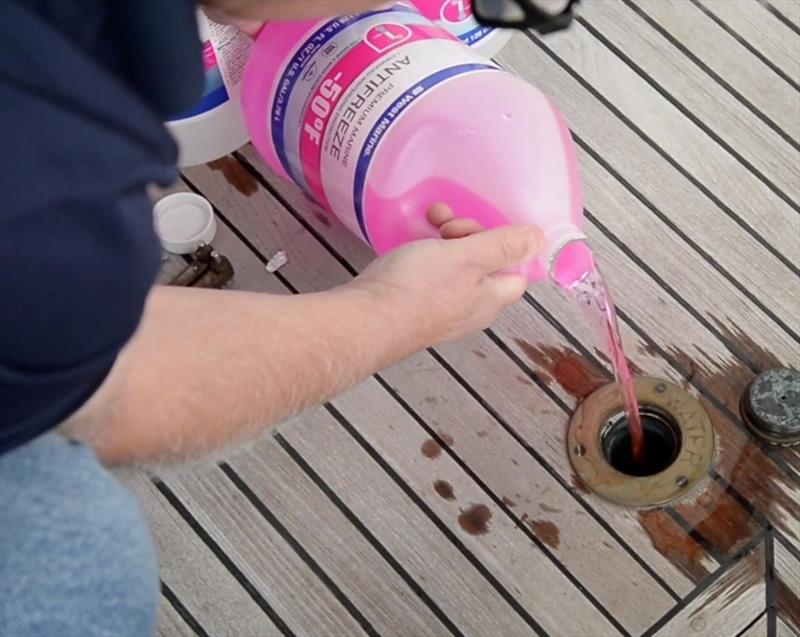
13 little boat winterizing secrets from BoatUS
by Scott Croft 3 Oct 2019 03:01 UTC

Did you know what type of antifreeze should be used winterize a boat's engine? © Scott Croft
Boaters across the country are getting ready to put their boats to bed for a long winter's nap, but not every boat owner knows all the secrets of winterizing a recreational boat.
Boat Owners Association of The United States (BoatUS) shares some quick tips to ensure safe storage until next season.
1. California, Florida and Texas have the most engine winterizing claims. Boaters in northern climates know to winterize but all it takes is one deep freeze in a normally balmy state to cause major damage to your boat. Unless you're in an area that never freezes (like Key West or Hawaii) you probably need to winterize.
2. Water expands almost 10% by volume. That expansion means that any water left in your engine, potable water system, or refrigeration system can do some major damage over the winter. Even an engine block can crack open during cold weather. The key is making sure all water gets drained out or replaced by antifreeze.
3. Batteries are happier at home. Remove your batteries, bring them to the garage or basement and use a trickle charger to keep them topped off to protect them and extend their life.
4. It's easier to prevent mold than to stop it. Without some air circulation, your boat's interior can build up condensation, which can lead to a moldy mess next spring. Solar-powered vents and boat covers that lets air circulate can help keep mold at bay.
5. Waxing the hull now makes spring clean-up much easier. The grunge of sitting all winter at a boatyard comes off a lot quicker if you apply a coat of wax before you put your boat to bed.
6. There are two types of antifreeze. Ethylene glycol - the kind in your boat's cooling system works fine for engines, but it's very toxic. Propylene glycol is safe for potable water systems and is also fine to use for the raw side of engine cooling systems - check the label. Make sure antifreeze is rated to protect down to the lowest possible expected temperatures.
7. Add fuel stabilizer before you fill your tank. That helps mix the stabilizer so it protects all of the gas. Running your engine for a few minutes after mixing it up will get some stabilized gas in the engine's fuel system, protecting it over the winter.
8. If enough water enters your fuel tank, gas with ethanol can phase separate over the long winter storage period. For boats with portable gas tanks, try to use up fuel now. Any remainder can be used (if unmixed with two-stroke oil) in your vehicle. If your boat has a built-in gas tank, fill the tank almost to the top, leaving a little room for expansion. This will minimize condensation on tank walls, stopping phase separation in its tracks. Never plug a fuel tank vent.
9. Write down what you did or had your shop do. That way, next spring you won't wonder if the lower unit lube was changed or the spark plugs replaced.
10. Take home any removable electronics, small outboards and even alcohol. The dark days of winter are when boats are most frequently broken in to. Not every thief is a professional - some may just want to raid your boat's liquor cabinet.
11. Remove all food. Not only might it spoil, but it can attract rodents and other pests, leaving you with a nasty spring surprise.
12. Using a heater as alternative to winterizing is a really bad idea. Not only can the power go out during a big winter storm leaving the boat unprotected, the heater, extension cord or connections can (and do) overheat and cause a fire.
13. In addition to snowstorms knocking-out power to heated indoor boat storage facilities, do-it-yourselfers sometimes make mistakes when winterizing. Either way, for boaters who live in northern states, protecting yourself with ice and freeze coverage insurance may be a smart option. It's often very affordable, but there's a deadline to purchase, typically by the end of October.
For more information on how to properly store a boat over the winter, including how to cover a boat, winterize plumbing, store ashore or in the water, and to get a free downloadable BoatUS Boater's Guide to Winterizing checklist, go to BoatUS.com/seaworthy/winter